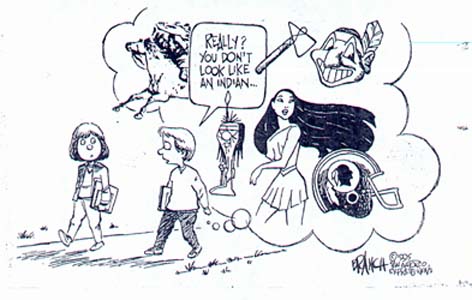If the media’s take on Aboriginal people is interpreted at face value, then kids are growing up with a skewed vision of what it means to be part of a First Peoples society. If they get their impressions from the news, they’ll likely view Aboriginal people as a negative force. And if their impressions come from films and TV programs, they’ll learn to think of Aboriginal people as inferior (passive, aggressive or drunk) or simply as non-entities, obliterated by omission.
When young Aboriginal people read the newspaper or turn on the TV, how often do they see their own life experiences reflected? Almost never, says Children Now, the U.S. research organization that analyzed the presence of Native American children on TV in 1999, and conducted focus groups with children from 20 tribes. Furthermore, they contend, those children have learned to associate positive attributes with white television characters, and negative attributes with non-white characters.
"The media have a lot of power to endorse stereotypes," says Susan Swan, an Ojibway from the Lake Manitoba First Nation. "We go into First Nations communities to talk to youth about gangs. When asked, the kids estimate that about 95 per cent of Aboriginal youth is involved in gangs. The actual number is three per cent. Why do they think these numbers are so high? It’s because this is what they get from television and newspapers."
The popular media are "cool" in the eyes of most kids. If the existence and value of a group of people is not affirmed by inclusion in media information and entertainment, the message is clear—they’re not important. In Aboriginal communities, this can contribute to, as one community sociologist calls it, "learned helplessness, alienation, and a sense of having no control."
The corollary is that eliminating the stereotypes would go a long way to ending the feelings of helplessness and alienation. Which again is obvious. You label someone as inferior (savage, redskin, squaw, etc.) and they feel bad. What part of that is so hard for people to understand?
For more on the subject, see Stereotypical Thinking Causes Racist Results and The Harm of Native Stereotyping: Facts and Evidence.


No comments:
Post a Comment